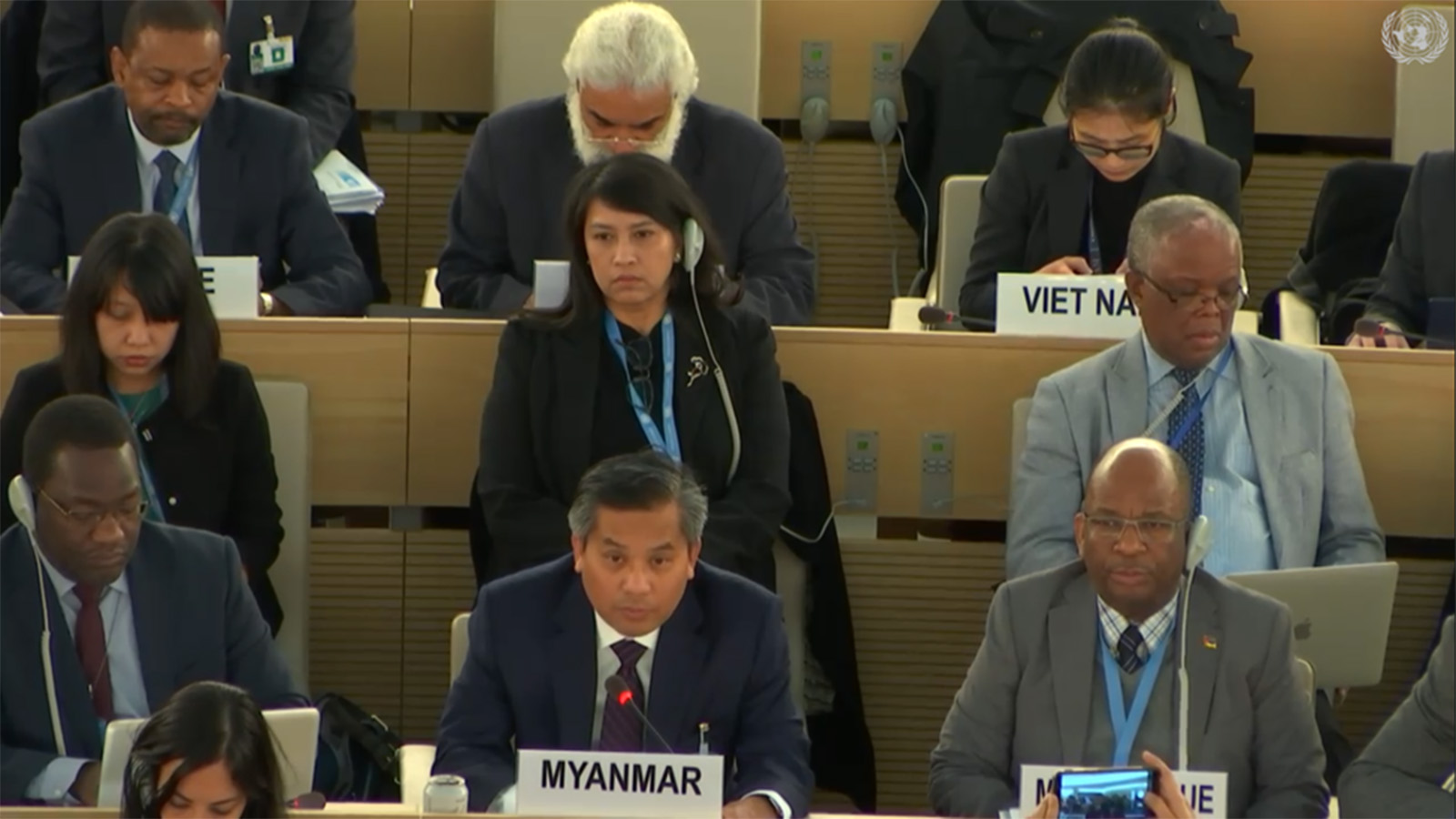February 29, 2020
The Interactive Dialogue on “High Commissioner report on the situation of human rights of Rohingya and other minorities in Myanmar” was held on 27 February 2020 during the on-going 43rd Session of the Human Rights Council in Geneva, Switzerland.
During the session, Permanent Representative of Myanmar U Kyaw Moe Tun delivered a statement in response to the report of the High Commissioner on Myanmar, submitted to the Council in pursuant to the Council’s resolution 39/2.
In his statement, the Permanent Representative stressed that changing one system to another requires time and space, and “the present democratically elected government of Myanmar which came into office in 2016 has been transforming the country from the authoritarian to a democratic federal union in the midst of multiple challenges resulted from decades of armed conflict, years of underdevelopment and social and political stagnation”.
Emphasizing the interlinkage between national reconciliation and peace, democracy and human rights, and sustainable and inclusive development in building democratic federal union of Myanmar, he underscored that achievement of the national reconciliation and peace is Myanmar’s highest priority. He also apprised the Council of the momentum gained in the peace process between the Government and the ethnic armed groups during the last three years. He further informed that next session of the Union Peace Conference is scheduled to be held in the first four months of this year.
Speaking about the complexity of the issue of Rakhine State, while sharing the concern of the international community over the conflict in Rakhine State, he urged the Council to look the root causes objectively and comprehensively as well as consider all political and economic issues involving cross-border migration since colonial time, poverty, lack of rule of law and security without overlooking the human emotions steamed from historical tension, mistrust and fear between the communities. He highlighted the number of concrete steps taken by the present Government since it came into office in finding a sustainable solution. He also pointed out that deliberate terrorist attacks of ARSA group in 2016 and 2017 not only derailed the Government’s efforts for finding sustainable solution to the issue of Rakhine State, also caused mass displacement and current humanitarian situation. Moreover, he said, “the armed conflict between Tatmadaw and AA added further challenges and complexity to the issue”.
Despite the challenges, he reaffirmed that “we never fail to lose our sight for finding sustainable solution and our top priority now is expeditious commencement of repatriation in accordance with the agreements signed between Myanmar and Bangladesh”. In this regard, he encouraged Bangladesh to strictly adhere to the signed agreements and to extend genuine and sincere cooperation.
On the accountability matter, he reiterated that that Myanmar is willing and able to address the issue of accountability. He apprised the Council of the final report of the Independent Commission of Enquiry (ICOE), submitted to the President of Myanmar in January 2020. He highlighted that the findings of the Commission’s Evidence Collection and Verification Team reveal no indication of pattern of conduct from which one could be reasonably concluded that the acts were committed with “genocidal intent”. He also informed the Council that in concurrence with the recommendations by the ICOE’s report, Myanmar President has transmitted the full report with annexes to the Union Attorney General and the Commander-in-Chief for further investigation and prosecution”.
Recalling the adoption of the of the Vienna Declaration and Programme of Action, he stressed that any attempt to take the matter to any international judicial or legal body shall be rejected as national remedies have not been exhausted.
He further informed of the utmost efforts by the Government to bring all communities together in building a democratic federal union through understanding and called for the international community to join hands with Myanmar in constructive way, stating “the reports and statements of the OHCHR and the approaches of the Council should contribute to our efforts for reconciliation, living in harmony and unity, and they should not be in a way of creating hatred among communities and disunity of the country”.
He expressed that targeting unfairly and disproportionately under special scrutiny by multiple mechanisms of the UN will not contribute positively to our efforts for building a democratic federal union.
However, he concluded by saying “whatever challenges we have, we are resolute to overcome them for achieving our goal of democratic federal union”.—MNA



